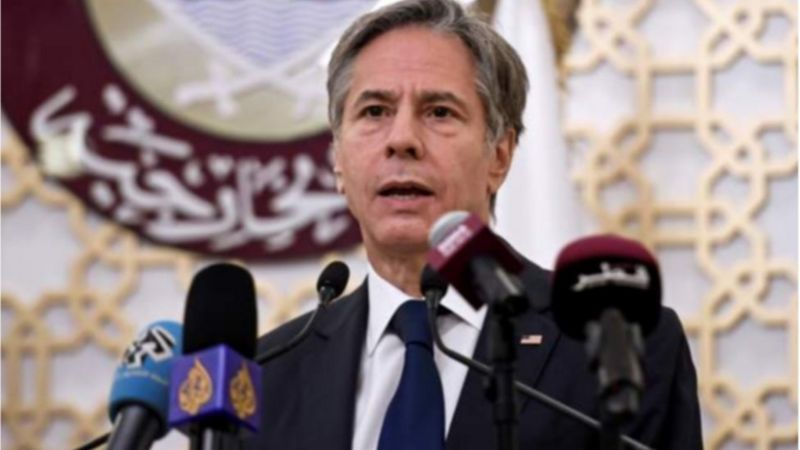US State Secretary Antony Blinken in an exclusive interview with Lotfullah Najafizada of TOLOnews said the United States has achieved what it went to Afghanistan to accomplish and the main aim was to suppress Al-Qaeda, which has been vastly “degraded.”
Blinken also said the United States remains committed to the people of Afghanistan, saying the US will work with the future government if it upholds the commitments it has made, especially on “combating terrorism” and honoring human rights and the rights of minorities.
Asked about the cost–in both dollars and lives–of the US’s involvement in Afghanistan, Blinken said the question will take time to answer, but the initial mission was “largely successful” as “Osama Bin Laden was brought to justice a decade ago, and Al-Qaeda as an organization with the capacity to attack us or anyone else from Afghanistan was greatly degraded.”
Asked about the rapid fall of Kabul, Blinken answered: “I have to say the so many Afghans in the security forces acted with incredible courage and bravery and tremendous sacrifice … but as an institution, it collapsed. And the government of course, the government fled ultimately.”
Blinken called the evacuation “extraordinary,” saying “over all, almost a hundred and twenty-five thousand people were evacuated in a very short period of time under incredibly difficult conditions including the threat posed by ISIS-K.” On American citizens, he said “nearly 6 thousand, virtually all of those who had identified themselves to us” and “wished to leave” were evacuated. He said the US is committed to those citizens who remain in the country.
An exchange was held between TOLOnews’ Najafizada and Secretary Blinken over former president Ashraf Ghani’s leaving the country.
Najafizada: “Did you help President Ghani flee the country?”
Blinken: No, in fact …
Najafizada: Did you know about it?
Blinken: No, I was on the phone with President Ghani the night before he fled the country. In our conversation … In our conversation we were talking about work that was being done in Doha, on the transfer of power, and in the absence of that succeeding, what he told me in the conversation the night before he fled is that he was prepared to fight to the death and in less than 24 hours he left Afghanistan. So, no I certainly didn’t know about it. And we certainly we did nothing to facilitate it.
Najafizada: And he took millions of dollars in cash with him. Your taxpayer’s money and Afghan’s money? Do you know about that?
Blinken: That I don’t know. What I do know, is that he left the country and again in very short period of time the security forces and its institutions collapsed and so did the government.
Blinken answered questions about the US stance toward the Taliban government, and recognizing its legitimacy, by emphasizing that the future would depend on Taliban actions.
Blinken: “The Taliban says it seeks international legitimacy and international support and that will depend entirely on what it does, not just on what it says. And the trajectory of its relationship with us and with the rest of the world will depend on its actions.”
The US secretary mentioned Taliban commitments on allowing freedom of travel, fighting against terrorism, as well as on the rights of women, girls and minorities.
“Now the Taliban has made a series of commitments, publicly and privately, including with regarding freedom of travel, with regard to combatting terrorism and allowing Afghanistan to be a launching point for terrorism directed at us or anyone else. Including as well upholding the basic rights of the Afghan people, to include women and girls and minorities.”
Blinken mentioned also the “important” commitment of “inclusivity in government” and that the “international community has also set clear expectations.” Blinken said: “So, for us, and not just for us, for many countries around the world, the nature of the relationship with the government going forward, will depend on the actions it takes.”
Asked to comment on the recent abuse of journalists and others, Blinken reiterated the future will depend on “actions.”
Blinken: “We will see by its actions, whether it corrects course on any of these incidents of abusive conduct. That’s going to be very important. Whether they are pre-policies, whether those policies are in fact carried out by people.”
Blinken said the US would work diplomatically and in terms of aid to influence the situation.
Asked about the US-Taliban agreement signed in Doha, Blinken stressed Taliban follow-through on agreements for counterterrorism. “We ultimately did good on the fundamental part of the agreement that involved us which is the removal of U.S. forces.” He added: “The Taliban has an enduring commitment, among other things, to make sure that Afghanistan is not used as a launching pad for terrorism. We are looking very much to see it makes good on that commitment even as we take the necessary steps to ensure that we can see and deal with any reemergence of terrorism.”
In answer to Najafizada’s question over whether or not the US was in contact with those fighting in Panjshir and other places against the Taliban, Blinken chose instead to comment on the future of international relations with the Taliban.
Blinken: “Our focus right now is on working with the international community to set clear expectations for the government that emerges in Afghanistan and to communicate those expectations to the government … and to work on that basis.”













